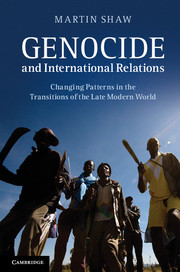Book contents
- Frontmatter
- Dedication
- Contents
- Acknowledgements
- Introduction
- Part I Perspectives
- 1 Emancipating genocide research
- 2 Fallacies of the comparative genocide paradigm
- 3 World-historical perspectives: international and colonial
- Part II Twentieth-century genocide
- Part III New patterns of genocide
- Bibliography
- Index
3 - World-historical perspectives: international and colonial
Published online by Cambridge University Press: 05 June 2014
- Frontmatter
- Dedication
- Contents
- Acknowledgements
- Introduction
- Part I Perspectives
- 1 Emancipating genocide research
- 2 Fallacies of the comparative genocide paradigm
- 3 World-historical perspectives: international and colonial
- Part II Twentieth-century genocide
- Part III New patterns of genocide
- Bibliography
- Index
Summary
The comparative genocide paradigm, I have argued, is an inadequate intellectual framework, which in turn reflects the cultural and political demands placed upon genocide studies. It reifies ‘mega-genocides’ as stand-alone events, exaggerates their discreteness and their domestic character, blocks view of the complex range of genocidal violence, and makes it difficult to pose meaningfully the question of the history of genocide. In this chapter, I argue for an alternative, looking at the phenomenon in world-historical terms, its variation between periods, and its connection to changing international contexts, and leading to a specification of the discontinuity of contemporary genocide with that of earlier periods. Before laying out my own approach, however, I discuss how the foundations of a different perspective have already been laid by a range of contributions, and I discuss their strengths and limitations. I focus on the ‘international’ and especially ‘colonial’ frames which have been the main foci of serious alternatives.
The international system
I have suggested that IR scholarship has accommodated to the comparative genocide paradigm, by limiting the significance of international relations to the response to domestically generated genocide.
- Type
- Chapter
- Information
- Genocide and International RelationsChanging Patterns in the Transitions of the Late Modern World, pp. 48 - 64Publisher: Cambridge University PressPrint publication year: 2013



